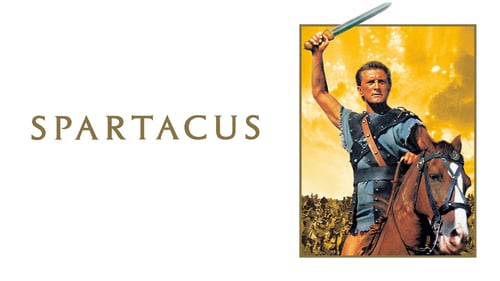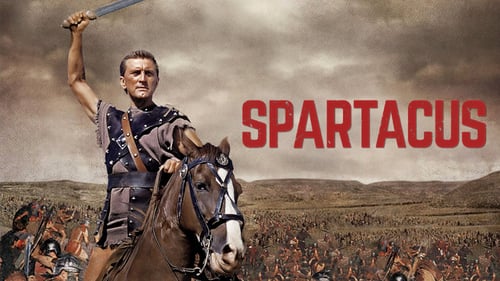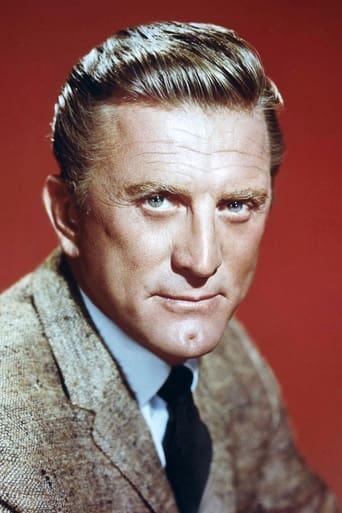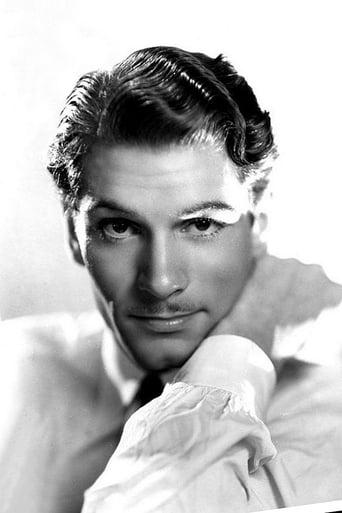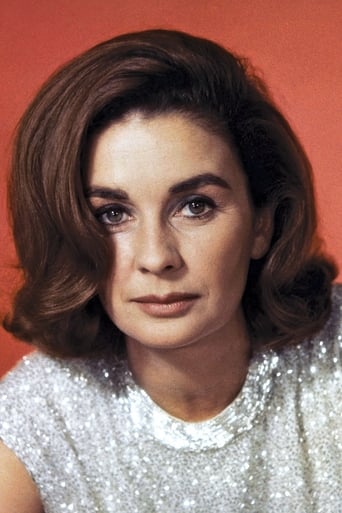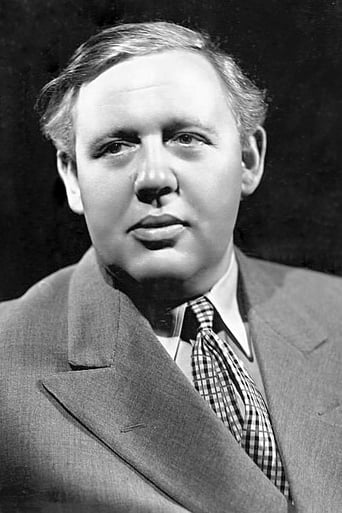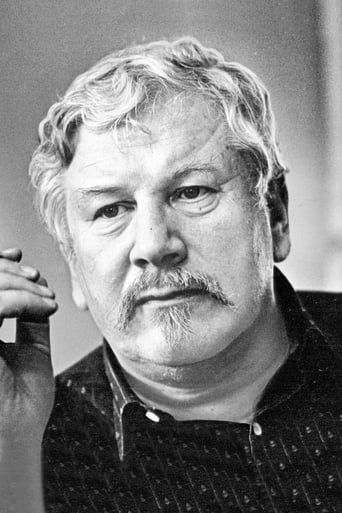Platicsco
Good story, Not enough for a whole film
StyleSk8r
At first rather annoying in its heavy emphasis on reenactments, this movie ultimately proves fascinating, simply because the complicated, highly dramatic tale it tells still almost defies belief.
Zandra
The movie turns out to be a little better than the average. Starting from a romantic formula often seen in the cinema, it ends in the most predictable (and somewhat bland) way.
rat_202
It was a bank holiday. I was ten, and watching Spartacus for the first time. This was before we got a video, so I would basically watch any movie that came on TV. Spartacus was a real shock to me. It was the first film I saw where the good guy doesn't win. in. I had seen Ben- Hur a few weeks before, with it's happy ending - y'know, reunited with his family, miraculously cured of leprosy, everyone lives happily ever after. Spartacus ends with him dying on a cross, having already lost to the Romans. It really affected me. I just didn't know a movie could end like that. I still loved it. Watching it now, I have tried to break down what it so effective, and why this movie stands up so well. Firstly, let me say - Laurence Olivier. Casting him as Roman General Crassus was a smart move, but a risky one. It could have back fired. He is so good he threatens to steal the whole movie. He doesn't, but as much as this movie is Douglas's it's also Olivier's. There's no denying Ustnov is good, but the Oscar really should have gone to Laurence.Another great performance is Tony Curtis as Antoninus, Crassus' personal slave, who quickly joins the revolt. He is no fighter, but a singer, though not much of one! I don't remember the 'snails and oysters' scene from my first viewing. It would have gone clean over my head anyway. It's a very touching scene. You feel that if it was done now, in the Game Of Thrones era, it would be considerably more explicit. And don't tell me Gladiator didn't borrow from this movie! One thing that Gladiator got wrong was the friendship forging between the fighters. When Spartacus asks another slave his name, the guy tells him 'You don't want to know my name. I don't want to know yours. One day we may end up having to kill each other.' It made more sense than Maximus and Juba going on about their wives and children. Ultimately though, it's that ending that still haunts me many years later. Spartacus, having been forced to kill Antoninus, on a cross, Varinia showing him his son, and begging him to die... I think it actually works because Spartacus doesn't say a word, no last monologue. Man, I'm getting goosebumps just thinking about it. Stanley Kubrick famously disowned the film, given that he didn't have complete creative control, but Spartacus is still better than practically all the sword and sandal epics being made then, or even now - Troy, anyone? It is acknowledged as a a classic, and deservedly so.
Miguel Neto
Spartacus is one of the best epic of all time, and one of the best films already made, not to mention that a year earlier had released Ben-Hur, and the public may attend expecting a movie or the same level or better, if someone ask me which epic I think better, Spartacus or Ben-Hur, I would answer Spartacus, even me finding Ben- Hur incredible, Spartacus suffered much in production, Anthony Mann directed the opening scene of the film, and then was fired for fighting with own Kirk Douglas that besides acts is producer, in his place entered yet unknown to much of the world, Stanley Kubrick, that even without much artistic freedom, managed to make a spectacular movie (even if he did not liking the movie), Spartacus already caught my attention, the photo caught my attention, excellent, the production is excellent, even not being level of Ben- Hur (what it is almost impossible), the cast is great, Kirk Douglas this excellent as Spartacus, even at times be a bit forced, more he sent too well, Jean Simmons is very well as Varinia (which does not exist), Laurence Olivier, in my opinion is the best thing in the movie, he's incredible, you feel anger Crassus, so was weird the scene he's a slap in Spartacus, the cast still has John Gavin, John Ireland, Tony Curtis, Charles Laughton, Peter Ustinov who won the Oscar for best supporting actor, he is well, but I think anyone who deserved to win an Oscar was Laurence Olivier, and Kirk Douglas deserved an indication at least, the soundtrack is excellent,the dialogues are very good, the script Dalton Trumbo is excellent, even some dialogues being longer than it should, the film has great moments, plus has two striking to me, the scene of the I Am Spartacus, which is incredible, see slaves shouting it, even knowing that this act would they be crucified, and the end when Varinia with the child is under the Spartacus cross is very exciting (even in real life, Spartacus actually died in battle), which left exciting in that final scene was the soundtrack is amazing, along with Varinia saying that his son was born free, Spartacus is too much in battle, is well done, even being a 1960 movie, the final battle is very good and very well done, the costumes are also very good, are various types of clothing, the film improves every time the first act is the slowest, since have almost no battle over the other two are excellent, it is quite shocking see all slaves on the cross, Spartacus is one of my favorite movies, this in my Top 10, is exciting, has great battles, great dialogues, a good direction of Stanley Kubrick, even he did not have much artistic freedom, and we see Kirk Douglas in his prime, I particularly think Spartacus along with the best Braveheart epic already done, with Lawrence of Arabia and Ben-Hur ago. Note 10
gab-14712
It is really interesting to see why this film, Spartacus was made in the first place. Obviously, historical epics were massively successful during this time period. But this particular film was made as an answer to 1959's Ben-Hur. In fact, it was Kirk Douglas's answer to that movie. Douglas was originally set to star in that movie, but Charlton Heston was cast over Douglas at the last minute, giving Douglas a feeling of bitter resentment. Both films have a very common theme: one man rising against the mighty Roman Empire to fight for their beliefs. I think Ben-Hur is the better film, but there is much to admire about this film.The movie, based off the popular novel by Howard Fast, was written by Dalton Trumbo. Trumbo is a well-known screenwriter, not only for his writing talent but because he was blacklisted because of his associated ties with communism. Kirk Douglas and director Stanley Kubrick stood strong behind their screenwriter and they publicly announced Trumbo wrote their movie, instead of Trumbo hiding behind a pseudonym. I found that to be a very courageous move on the part of Douglas and Kubrick, because that could have easily hurt the movie's chance at the box office. Luckily, the film was a box office smash and was very popular with the critics and the audience alike.This film has a Roman slave named Spartacus (Kirk Douglas) as the film's central character. Spartacus is held at a gladiatorial school ran by the amusing Lentulus Batiatus (Peter Ustinov). One day, he starts a revolt because he became angered at the notion of fighting to the death for the entertainment of spoiled women. This revolt soon spread all across Italy, where thousands of slaves joined the cause. Their plan was for Silesian pirates to transport them away from Italy to new lands. Meanwhile in Rome, Senator Gracchus (Charles Laughton) schemes to have the slaves taken down by a Roman garrison. After they failed, his mentor Marcus Licinius Crassus (Laurence Olivier) decides to lead his own army against Spartacus's slaves. Now Spartacus must face the might and power of the Roman army.Now compared to other epics of the time, I didn't like this film as much. It's certainly not a bad film, not even close to being so. The problem is the movie is a tad overlong and the story drags at certain moments. Some of the dialogue was cheesy too. By today's standards, the dialogue does not hold up very well and some of the words are laughingly bad. These complaints dragged the movie down, but only to a very small degree.There are many things I did admire about the film. There are plenty of majestic battle sequences and I liked them very much. I loved watching how the revolt started and I was cheering for Spartacus the entire time. I liked the political backdrop of the movie. Obviously, Spartacus uprising has a major political undertone which is revolution, a very appropriate theme. We also get to go behind the scenes and see how Roman politics influenced the war. It's a common fact that Roman senators always schemed against each other. The film also did something different, when compared to other epics. These other epics usually provide the normal happy ending. Well, that is not much the case with this film. If you follow history, you'll know the fate of Spartacus. But I'm not going to spoil anything for those who don't know. But the ending was very powerful and memorable. Speaking of powerful, my favorite scene was when a Roman general asked Spartacus's army where Spartacus was. Each soldier stood up and said, "I'm Spartacus." A very powerful scene showing the loyalty the slaves had for Spartacus and his cause.This film was the first big film of Stanley Kubrick's career. He was 30 when he directed the film, but he already had 4 feature films under his belt before this film. He masterfully directed the film, but it is publicly known that he disowned the film. It's his most straightforward film, and it was nominated for 6 Oscars (and won 4 of them). But Kubrick didn't like the film he made. He is one of my favorite directors, and you'll see more reviews of his films down the line.The film features fine performances from everyone involved. One of Kubrick's strengths is getting the very best out of his actors. Kirk Douglas portrayed Spartacus as a strong man driven by perseverance. Peter Ustinov, who won Best Supporting Actor at the Oscars for his role as Batiatus, does a wonderful job. He is consistently funny and he has a great screen presence whenever on screen. Laurence Olivier delivers a deep performance as Crassus, who is identified as bisexual in the movie. Jean Simmons does a good job as Varinia, the wife of Spartacus. She delivered some emotional performances. Just watch the ending of the movie to see why I say so. Also, keep an eye on a meaty supporting turn by Tony Curtis as Antoninus, the man who loves Spartacus like a brother. Finally, Charles Laughton is great as the soft-hearted scheming Roman Senator, Gracchus.Overall, I liked Spartacus, but I didn't really love it much. It runs into some boring stretches and parts of the movie such as the dialogue and costumes don't hold up well. But I liked how the film strived to be more historically accurate than previous epics. This is a nice film to learn something about Ancient Rome. The film does feature wonderful, bold performances, great direction, good production design, and spectacular battles. Not the greatest epics ever made, but good enough.My Grade: B
GusF
Based on the 1951 novel by Howard Fast rather than the events of the Third Servile War directly, the film depicts Spartacus' slave rebellion with all the flair and grandeur that 1960s Hollywood could muster. Directed by Stanley Kubrick, it is a thrilling story of freedom, political machinations and love set in the ancient world. It is a very well written film with often marvellous dialogue.At 43, Kirk Douglas was perhaps a little old to play the title character but he is very good as the dignified, principled man who wishes to free every last slave in Italy. Like Charlton Heston, he has a face that looked as if it was chiseled from marble which gave him the perfect look for historical epics. More importantly, Douglas' performance effectively communicates Spartacus' intelligence and courage and I never doubted why so many would be willing to follow him anywhere. To his followers, he is a symbol of hope or even a Messiah but, for the audience, he is humanised through his relationship with Varinia, played by Jean Simmons. They meet in Batiatus' gladiator training school and soon fall in love. It is a gentle, tender love story and Douglas is at its best in these scenes. He and Simmons have great chemistry. One of the most gifted actresses of her generation, Simmons excels as the proud, brave and intelligent Varinia. As good as she is in her scenes with Douglas, her best moment is the scene towards the end of the film after she is recaptured and sold to Crassus, played by Laurence Olivier, in which he threatens to kill her newborn son if she does not submit to him. Varinia realises that he is afraid of Spartacus and disturbed by the fact that he inspired so much love and devotion, not least of all from her. Simmons, who previously played the Ophelia to Olivier's Hamlet, plays this scene wonderfully and we get a real sense of Varinia's strength.Speaking of Olivier, he is characteristically excellent as Crassus, one of Rome's greatest generals and one of the wealthiest men to have ever lived. A patrician from a very old Roman family who despises the mob, he is an extremely shrewd military and political strategist who manipulates the threat posed by Spartacus to substantially increase his own political standing. He is eventually named Consul of Rome with Julius Caesar as his protégé, thereby beginning the transformation of the Roman Republic into the Roman Empire. On the battlefield, he manages to defeat Spartacus by forcing him to march on Rome where not only his own legions but those of Pompey and Lucullus are waiting for him. Crassus is a very dangerous man of fierce intelligence, which makes him a very compelling character. In his penultimate film before his death in 1962, the great Charles Laughton is wonderful as Gracchus, the (fictional) leader of the Senate and Crassus' hated rival. Gracchus is an interesting character who is even more shrewd than Crassus. He does not believe in the gods but worships them publicly and is perfectly willing to make deals with criminals, namely the Cilician pirates, if he believes that doing so is in the interests of Rome. He is part of the corruption that plagues the Roman Republic but considers that better than a dictatorship and I certainly can't disagree with him there. Gracchus is not a particularly good man but he is a far better one than his rival.As strong as the film's cast may be, it is the one and only Peter Ustinov who steals the show as the slave trader Batiatus. He won the first of two Best Supporting Actor Oscars for the role, the only actor to win an Oscar for a Kubrick film. Batiatus is scornful of Crassus in private but extremely obsequious to him whenever they meet. He has a very strong sense of self-preservation or, to put it another way, he is a complete coward. This is best demonstrated when Crassus orders him to remain in camp the night before the final battle with Spartacus so he can identify him. When Batiatus asks what will happen to him if Spartacus wins, Crassus tells Batiatus that he has no doubt that he will help Spartacus to identify him. This is one of Batiatus' best scenes as it perfectly illustrates that his first loyalty is most definitely to himself. He possibly becomes a better man after being flogged on Crassus' order but he never comes to regret his earlier actions and only agrees to transport Varinia and her son out of Rome in exchange for two million sestertii. Tony Curtis is good as Antoninus and I love the father-son relationship that develops between him and Spartacus but he is underdeveloped, making him the least interesting of the major characters. With his tough guy image, Curtis may have been miscast as a singer and poet with no practical experience of fighting before joining Spartacus' army. The only weak links are Charles McGraw as Marcellus and John Dall as Marcus Glabrus but neither of them have particularly big roles.Overall, this is an extremely intelligent film. Spartacus is crucified, meaning that it lacks a traditional Hollywood ending but there is still a great sense of hope as his son has been granted his freedom. My main historical area of interest is about 2,000 years after Spartacus' death but I think that the film sticks to the general thrust of events while admittedly taking quite a few liberties here and there. However, these are only minor issues which in no way detract from a brilliant film, one of the best of the historical epics which dominated 1950s and 1960s Hollywood.



